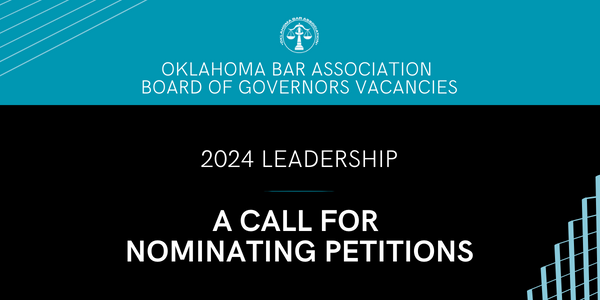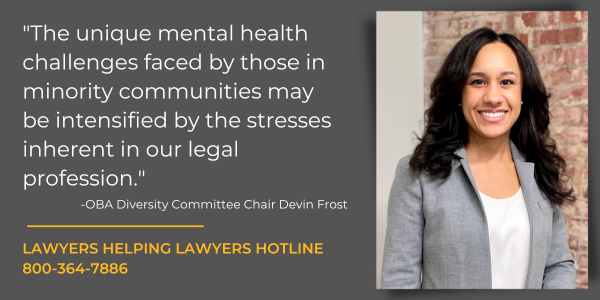More
Born in Chickasha in 1924, Ada Lois Sipuel Fisher was instrumental in changing Oklahoma's segregation laws so she could achieve her lifelong ambition of becoming a lawyer. Her persistence opened the doors not only for herself but also for other Black students to attend law school in Oklahoma. She graduated from the OU School of Law in 1952. Her bold actions made her a key figure in the Civil Rights Movement.
In her honor, the OBA Diversity Committee proudly presents the Ada Lois Sipuel Fisher Diversity Awards every year at the OBA Annual Meeting to individuals and organizations that promote diversity and inclusion initiatives in our great state.
The nomination period for these awards will close Aug. 1. Make your nomination today and honor an attorney, member of the judiciary or organization that has demonstrated a commitment to resolving inequities and protecting civil and human rights.
The deadline for submitting nominating petitions is 5 p.m. Friday, Sept. 1.
The Board of Governors is comprised of 17 active members of the Oklahoma Bar Association. One representative is elected for each of the nine Supreme Court judicial districts, as such districts existed prior to Jan. 1, 2020 [Order No. SCBD 4483 (2020 OK 17)], by lawyers in those respective districts plus three statewide at-large members and the Young Lawyers Division chairperson. Officers are the president, vice president, president-elect and secretary/treasurer.
For information on current board members and officers, visit the Board of Governors page.
As we continue to recognize July as Minority Mental Health Awareness Month, OBA Diversity Committee Chair Devin Frost shares the importance of awareness regarding mental health in minority communities.
"The unique mental health challenges faced by those in minority communities may be intensified by the stresses inherent in our legal profession," Ms. Frost said. "During Minority Mental Health Awareness Month, we are reminded that mental health is a foundational element of a healthy community, and we are encouraged to help dispel the cultural stigma still surrounding mental health care. In my experience, having the courage to engage in conversations about mental health leads to an increased sense of strength, well-being and connection to others."
If you are an attorney who is feeling overwhelmed or is struggling with severe stress, anxiety, depression or suicidal thoughts, the OBA offers all bar members up to six hours of free short-term, problem-focused or crisis counseling. The service is strictly confidential. Call the Lawyers Helping Lawyers hotline (800-364-7886) to be referred to a counselor in your area.
The Oklahoma Bar Journal is soliciting article submissions for our September, October, November and December issues. Topics for these issues are listed below. If you would like to share your knowledge on these topics, contact the editor for the corresponding month's issue.
SEPTEMBER: Corporate Law
Editor: Jason Hartwig
OCTOBER: Access to Justice
Editor: Evan Taylor
NOVEMBER: Agricultural Law
Editor: David Youngblood
DECEMBER: Family Law
Editor: Sheila Southard
Save the Date for the Women in Law Conference Sept. 22

The OBA Women in Law Section will be hosting their 2023 Women in Law Conference at the Civic Center Music Hall in Oklahoma City on Sept. 22, 2023. This year's guest speaker will be Chandler Baker, a New York Times bestselling author. Her works include "Cutting Teeth," "The Husbands" and "Whisper Network," which was a Reese Witherspoon Book Club Pick. Ms. Baker attended law school at the University of Texas at Austin and worked as a lawyer for a major sports franchise and as a corporate attorney. The Women in Law Conference will be worth six hours of MCLE, and the Mona Salyer Lambird Spotlight Awards will be presented at the conference. Make sure you save the date!
Featured CLE
By OBA MAP Director Jim Calloway

"Office Sharing Arrangements with Other Lawyers" was the subject of American Bar Association Formal Opinion 507, released July 12.
The opinion “addresses some minimum ethical requirements and suggested practices arising in the office sharing context, particularly in the areas of confidentiality, conflicts of interest, supervision, and communications concerning a lawyer’s services.” It notes that when lawyers in an office sharing arrangement share support staff, such as receptionists, administrative assistants and paralegals, maintaining the confidentiality of client information is “tested.”
But some practical advice is omitted. The opinion notes that lawyers in an office sharing arrangement should use separate business cards, letterhead, directory listings, office signs and advertisements describing their distinct practices. But it fails to mention one important safeguard. In my view, every lawyer in such an arrangement should be contractually obligated to the other lawyers to have a written contract with every client and to include a disclosure about the office sharing arrangement and that only the lawyer signing the contract is responsible to the client. Perhaps the client even initials that provision.
Learn to use the term “officemate” rather than partner or associate when discussing the other lawyers.
The opinion notes it is natural for lawyers in office sharing arrangements to informally consult one another about their respective client matters, and it gives guidance in that area.
“It is desirable for lawyers sharing office space to have separate telephone lines, but a receptionist may answer a common telephone line with a generic salutation such as ‘Law Offices’ to avoid implying that the lawyers are practicing together in the same firm,” according to the opinion.
I think it is important for lawyers to have different phone numbers, more because of the practical considerations than the ethical ones. If there is a need to terminate the sharing arrangement, the dispute over who gets the jointly purchased phone number can be a huge issue. It also prevents one lawyer from paying for marketing efforts that inadvertently benefit the other lawyers. Separate websites are often the best policy for the same reason.
The problems with lawyers representing clients with adverse interests are numerous, especially if the office has only one waiting room. It may make sense to consider not taking clients when another attorney in the office represents the opposing party. That policy should be in writing. But there will be challenges. At some point, Lawyer A will sign up a new divorce client on Monday, and Lawyer B will be prohibited from agreeing to represent the opposing party on Tuesday, even if that potential client is the lawyer’s best friend from high school. In fact, Lawyer B should not even meet with the client on Tuesday. So some process to track these conflicts must exist even though it is office sharing and not a law firm.
If you are in an office sharing arrangement, read this opinion and share it with your officemates.
The Oklahoma Bar Journal is a publication of the Oklahoma Bar Association. All rights reserved. Copyright© 2023 Oklahoma Bar Association. Statements or opinions expressed herein are those of the authors and do not necessarily reflect those of the Oklahoma Bar Association, its officers, Board of Governors, Board of Editors or staff. Although advertising copy is reviewed, no endorsement of any product or service offered by any advertisement is intended or implied by publication. Advertisers are solely responsible for the content of their ads, and the OBA reserves the right to edit or reject any advertising copy for any reason. Legal articles carried in The Oklahoma Bar Journal are selected by the Board of Editors. Information about submissions can be found at www.okbar.org.


















